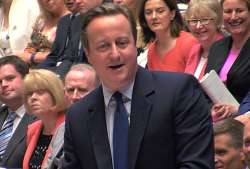London: Soon to be ex-British Prime Minister, David Cameron made a final appearance in the House of Commons as PM on Wednesday before handing over to his successor, Theresa May.
In his final address to House of Commons, Cameron said he will miss “the roar of the crowd and “barbs of the opposition” before signing off with phrase “I was the future once.”
Cameron, who announced his resignation after losing the campaign to keep Britain in the European Union, was to stay on the job till September till the Conservative Party chose a new candidate for the office.
However, May remained the only contender for top post after her rival Andrea Leadsom bowed out two days ago, following which Cameron announced that he would leave the office on Wednesday.
He took his final weekly prime minister's questions session at noon before travelling to Buckingham Palace to tender his resignation to Queen Elizabeth II.
“I will watch these exchanges from the back benches. I will miss the roar of the crowd, I will miss the barbs from the opposition, but I will be willing you on. And when I say willingly you on, I don’t just mean willing on the new prime minister at this despatch box, or indeed just willing on the front bench defending the manifesto that I helped put together,” Cameron said in his address to the House of Commons.
In his final remarks, Cameron said, “Nothing is really impossible if you put your mind to it. After all, as I once said, I was the future once.”
May will later visit the palace, where the queen will ask her to form a new government.
The new leader, Britain's home secretary — in charge of immigration and law and order — for the past six years, has the tough task of calming the country, and the financial markets, after upheaval following the result of the June 23 referendum.
She is expected to quickly unveil a new Cabinet lineup, including a minister in charge of implementing Brexit, a British exit from the EU.
May, who backed remaining in the EU, will also be expected to reward prominent campaigners for a "leave" vote with key jobs. Observers are keen to see if she appoints former London Mayor Boris Johnson and Justice Secretary Michael Gove, onetime Conservative leadership contenders who jointly headed the "leave" campaign, and then turned on one another.
There is also speculation that May, Britain's second female prime minister — after Margaret Thatcher — will boost the number of women in top posts.
Cameron told The Daily Telegraph it had been "a privilege to serve the country I love."
He said he hoped he was leaving "a stronger country, a thriving economy and more chances to get on in life."
Newspapers offered harsher judgments of a politician toppled by his decision to call a referendum on EU membership — which he then lost. The Sun said Cameron had been "undone by his Olympian overconfidence," while the Guardian called him a "prime minister of broken promises."
But Cameron drew praise from an old adversary, with European Commission President Jean-Claude Juncker saying he would miss the British leader.
Cameron once derided Juncker as a Brussels backroom bureaucrat and tried to block him from becoming commission president.
Juncker told reporters in Beijing that he had "no beef" with Cameron.
"I have experienced a man who is serious, who is a fan of no-nonsense policy and who was delivering at each and every moment when things started to become serious," Juncker said.
(With AP inputs)
Latest World News
